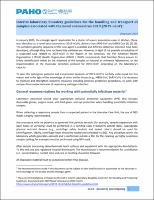Interim laboratory biosafety guidelines for the handling and transport of samples associated with the novel coronavirus 2019 (2019-nCoV), 28 January 2020
Date
2020Document Number
PAHO/PHE/IHM/COVID-19/20-007
Metadata
Show full item recordOther Language Versions
Abstract
In January 2020, the etiologic agent responsible for a cluster of severe pneumonia cases in Wuhan, China, was identified as a novel beta-coronavirus (2019-nCoV), distinct than SARS-CoV and MERS-CoV (1) (2) (3). The complete genomic sequence of this new agent is available and different detection protocols have been developed, although they have not been fully validated yet. However, in light of the possible introduction of a suspected case related to 2019-nCoV in the Region of the Americas, the Pan American Health Organization / World Health Organization (PAHO / WHO) recommends that Member States ensure its timely identification either by the shipment of the samples to national or reference laboratories, or the implementation of the molecular detection protocol for 2019-nCoV, depending on the laboratory's capacity. To date, the pathogenic potential and transmission dynamics of 2019-nCoV is not fully understood. For this reason and in the light of the knowledge of other similar viruses (e.g., MERS-CoV, SARS-CoV), it is necessary to maintain and strengthen biosafety measures including personal protection procedures, to work with samples from suspected cases of respiratory pathogen infection.
Subject
Collections
This notice should be preserved along with the article's original URL.Attribution-NonCommercial-ShareAlike 3.0 IGO
Related items
Showing items related by title, author, creator and subject.
-
Pan American Health Organization; Health Emergencies (PHE) (PAHOUnited StatesWashington, D.C., 2020)Coronaviruses are a group of highly diverse RNA virus in the Coronaviridae family that are divided in 4 genera: alpha, beta, gamma and delta that cause disease varying from mild to severe in human and animals. There are ...
-
Pan American Health Organization; Health Emergencies (PHE) (PAHOUnited StatesWashington, D.C., 2020)Coronaviruses are a group of highly diverse RNA viruses in the Coronaviridae family that are divided in 4 genera: alpha, beta, gamma and delta that cause disease varying from mild to severe in human and animals (1-3). There ...
-
Rodrigues Campos, Karoline; Tavares Sacchi, Cláudio; Abbud, Adriano; Caterino-de-Araujo, Adele (2021)[ABSTRACT]. COVID-19 vaccination began in São Paulo, Brazil in January 2021, first targeting healthcare workers (HCWs) and the elderly, using the CoronaVac vaccine (Sinovac/Butantan) and subsequently the Oxford/AstraZeneca ...





